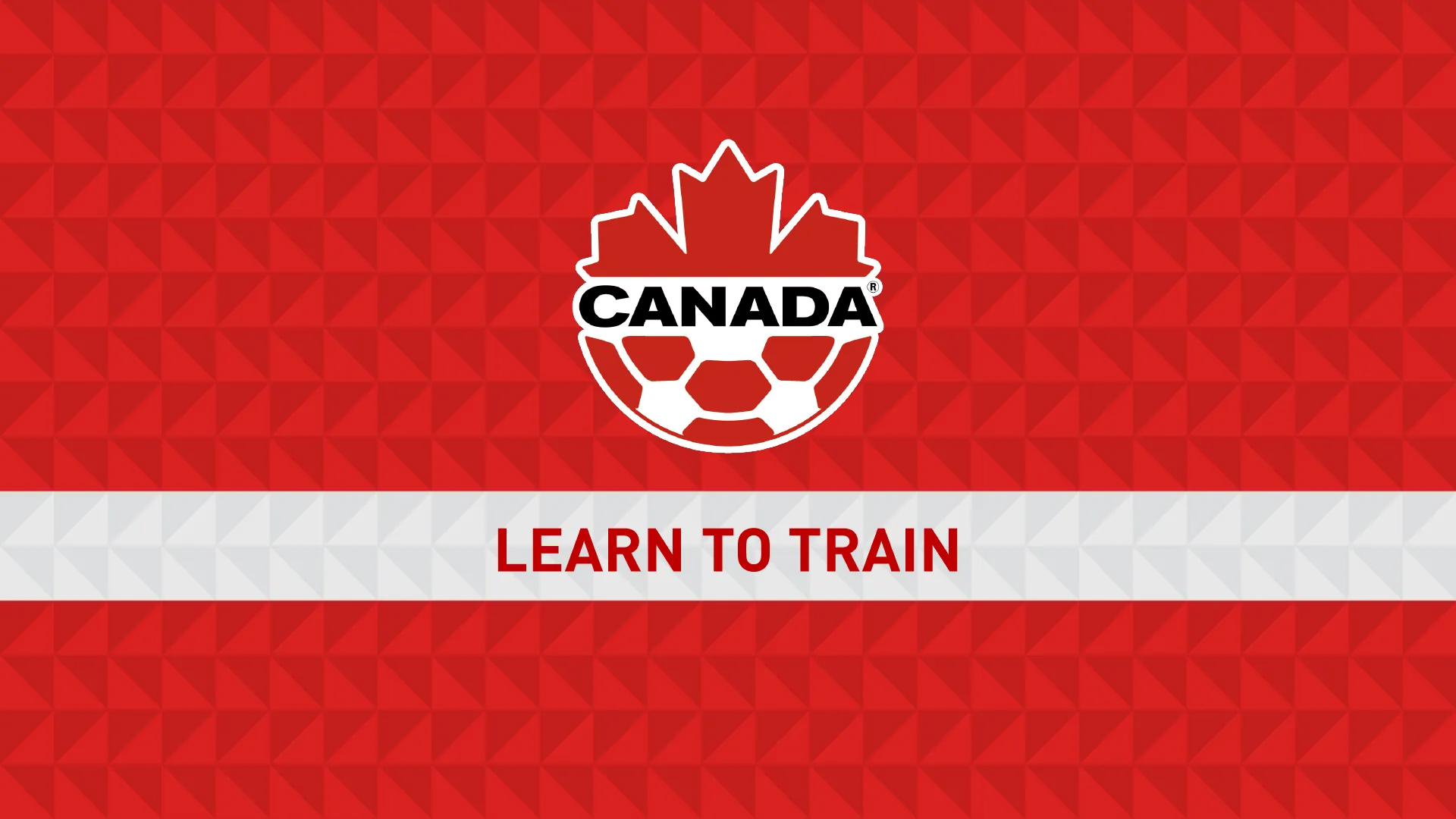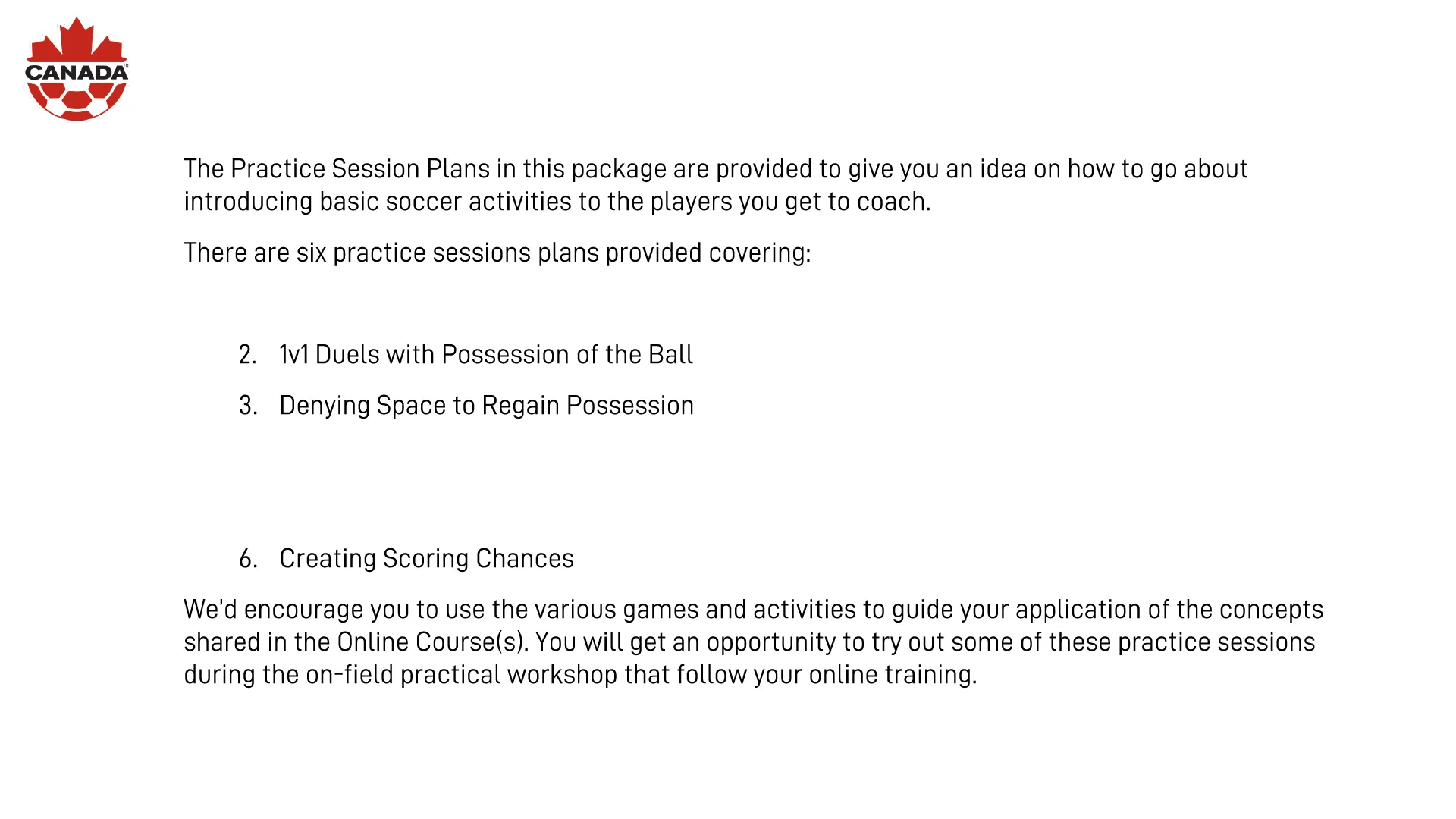Learn to Train Pre-designed Practice Session Plans from Canada Soccer
Slides from Canada Soccer about Learn to Train Pre-designed Practice Session Plans. The Pdf provides six practice sessions for soccer training, focusing on fundamental activities like 1v1 duels and space management. This vocational education material in Physical Education is designed for coaches, offering structured ideas and guidelines for applying concepts learned in online courses.
Ver más63 páginas


Visualiza gratis el PDF completo
Regístrate para acceder al documento completo y transformarlo con la IA.
Vista previa
CANADA® LEARN TO TRAIN
Pre-Designed Practice Session Plans Overview
The Practice Session Plans in this package are provided to give you an idea on how to go about introducing basic soccer activities to the players you get to coach.
There are six practice sessions plans provided covering:
- 1v1 Duels without Possession of the Ball
- 1v1 Duels with Possession of the Ball
- Denying Space to Regain Possession
- Exploiting Space to Maintain Possession
- Preventing Scoring Chances
- Creating Scoring Chances
We'd encourage you to use the various games and activities to guide your application of the concepts shared in the Online Course(s). You will get an opportunity to try out some of these practice sessions during the on-field practical workshop that follow your online training.CANADA®
1V1 DUELS WITHOUT POSSESSION OF THE BALL
Learn to Train Key Questions
SESSION OBJECTIVES o Primary: To create an environment that encourages players to regain possession in 1v1 situations. o Secondary: Players will also be required to use searching skills to recognize and deny spaces and gaps.
QUESTIONS FOR PLAYERS TO EXPLORE o Who is the focus? The defender in a 1v1 situation. o What is our objective? To deny progression of the ball and regain possession. o Where on the field? 1v1 situations will occur everywhere on the field. Consider where on the field and the nature of urgency. Example: Are players in a position where they can score? o When should a player attempt to win the ball in a duel? Identify a bad touch, players facing the wrong way and receiving a bad pass. o Why will this help? To better understand moments to effectively win the ball and avoid getting off balance. o How can you be successful? Reduce the space when you can, reduce options to exploit, anticipate and be alert, attempt to put yourself between the ball and the player when opportunity allows. o Consider: Awareness (perceive), identify the problem (conceive), identify potential options (decide), how can you remove options (deny), carry out action (execute) & assess whether it was successful (reflect)CANADA®
Physical Literacy Toolbox
Why develop Physical Literacy?
Physical Literacy increases physical activity, which increases personal success
Educational success Cognitive skills Mental health Psychological wellness Social skills Healthy lifestyle habits Physical health Physical fitness
TRAVELLING MOVEMENTS o Walking o Running o Jumping o Hopping o Skipping o Backwards o Side shuffle o Crawling o Rolling
BALANCE MOVEMENTS o One leg balance o Landing o Spinning o Stopping o Twisting o DodgingCANADA®
Session Parts
PART ONE: 1V1 WARM UP
- A fun activity that encourages players to react & change direction in a 1v1 situation
- Players will also be required to use searching skills to recognize and deny spaces and gaps.
PART TWO: 3V3 TO END ZONES
- This fun game allows players to explore a representative environment that has direction, teams and creates 1v1 situations.
- Players will also be required to use searching skills to recognize and deny spaces and gaps.
PART THREE: 2V2 TO GOAL
- This activity encourages players to defend in a 2v2 scenario.
- Players will also be encouraged to explore the difference of defending near a goal.
PART FOUR: 7V7 OR 9v9
- This game allows players to explore a representative game that has direction, teams and goals.
CHALLENGE FOR HOME: DEFEND
- This is a fun activity encouraging players to develop 1v1 attacking and defensive skills.CANADA®
Managing the Environment
FIELD AND EQUIPMENT
- Setup a space that is appropriate based on the needs & number of players involved.
- Any activity that includes players scoring in a goal can be recreated by using two cones (goals are preferable).
- Any activity that includes a small target goal can be substituted with players as a target.
PLAYERS
- If activities are illustrated as using less players, then in attendance, consider these solutions to keep players active:
- Multiple stations
- Third team (consider duration inactive)
- Resting players/Substitutions (consider duration inactive) can they juggle, 1v1, 2v1, etc.
- Tasking players - Example: Target player vs a target goal
CONSTRAINTS/CONDITIONS
- Consider using & exploring 'Constraints' or 'Conditions' to assist the players in making the session easier or more challenging. In the session examples, we will continue to use the language 'MAKE IT EASIER' & 'MAKE IT HARDER'
- You can also use 'Constraints' & 'Conditions' to invite players to solve specific problems with a repetition of actions or solutions. EXAMPLE: If you want players to dribble you can reward points to the opposition if they regain the ball intercepting a pass. This as a result does not over constrain the players choice but does create a risk vs reward scenario for the players to explore.
- COACH CONSIDER: Avoid telling players they 'cannot' perform a specific action or solution. All options should be made available with rewards or risk associated to it.CANADA®
1V1 WARM UP
Programme national de certification des entraîneurs National Coaching Certification Program
OBJECTIVE 1V1 Warm Up
- RECOMMENDATION: 10X10 with eight players · Red (attacker) attempts to run to either gate without being tagged by White (defender) · COACH CONSIDER: Adding two additional groups in the same space if players are waiting for long periods of time. · MAKE IT EASIER: Make the space smaller. . MAKE IT HARDER: Make the space bigger OR Add a ball. O CANADA L @ Copyright Canada Soccer 2021 Players m Dribble ·> Pass/Shot Movement
3V3 TO END ZONES
Programme national de certification des entraîneurs National Coaching Certification Program
OBJECTIVE 3V3 End Zones
- RECOMMENDATION: 25×25+5 end zone with eight players in two teams. · 3v3 directional game to end zones. Players score a point by dribbling into the end zone. o If a player passes to a teammate and it is intercepted by the opponents, the defending team gains a point. This will encourage players to search and explore dribbling opportunities creating 1v1 situations but does not restrict the decision of a pass when it is available. o MAKE IT EASIER: Pair players up with someone on the opposition who they can only defend. END ZONE CANOA END ZONE @ Copyright Canada Soccer 2021 Players m Dribble · > Pass/Shot Movement
2V2 TO GOAL
Programme national de certification des entraîneurs National Coaching Certification Program
OBJECTIVE 2V2 Goal
- RECOMMENDATION: 20×12 for 9-10 players. o 2v2 directional wave activity with two attackers (Red) attempt to score against the two defenders (White) and goalkeeper. o Once the ball is secured by the defenders or goalkeeper, or the ball goes out of play, the next pair of attackers drive in. The original attackers return to the starting position to wait for their next turn. · Two designated defenders work for a set period of time. o COACH CONSIDER: The coach should be involved to motivate the defenders, as the practice is both mentally and physically draining. COACH CONSIDER: Introducing scoring systems: points for clean sheets or successful defending attempts, for example. CANAD 6 @ Copyright Canada Soccer 2021 Players m Dribble 7 Pass/Shot Movement
7V7 OR 9V9
Programme national de certification des entraîneurs National Coaching Certification Program
OBJECTIVE 7V7 or 9V9
- REQUIREMENT: 60X40 with fourteen players in two teams OR 80X50 with eighteen players in two teams. o Directional game with each team scoring on their opponents' goal. COACH CONSIDER: Have balls around the playing space and when they go out of bounds either allow players to grab then nearest ball or the coach can serve into the playing area. · COACH CONSIDER: Continue to encourage the importance and value of establishing team shape. EXAMPLE: Red (1-2-3-1) & White (1-3-2-1) as illustrated on the diagram. ‹. @ Copyright Canada Soccer 2021 Players m Dribble > Pass/Shot Movement
CHALLENGES FOR HOME: DEFEND
Programme national de certification des entraîneurs National Coaching Certification Program
OBJECTIVE Home Defend Challenge
- Setup a space and create two gates. · One player attempts to tag the other player who can run in either gate. MAKE IT HARDER: Add a ball for the attacker. O O O O CANADA @ Copyright Canada Soccer 2021 Players m Dribble 7 Pass/Shot Movement
1V1 DUELS WITH POSSESSION OF THE BALL
Learn to Train Key Questions
SESSION OBJECTIVES o Primary: To create an environment that presents moments to explore how to attack and beat an opponent 1v1. Secondary: Players will also be required to use searching skills to locate available gaps & space.
QUESTIONS FOR PLAYERS TO EXPLORE o Who is the focus? The attacker in a 1v1 situation. o What is our objective? To explore movement and actions with the ball to beat an opponent. o Where on the field? 1v1 situations will occur everywhere on the field. Consider discussing risk vs reward with reference to where on the field. Example: If players lose the ball can the other team score? o When should a player attack 1v1? When a player identifies spaces or gaps to exploit. o Why will this help? If a player can beat an opponent or exploit gaps and space, they can get their opponent off balance. o How can you be successful? Explore a variety of surfaces of the foot to move the ball, bending the knees to easily change direction and change pace where necessary, explore deception actions such as dropping the shoulder, step overs etc. o Consider: Awareness (perceive), identify the problem (conceive), identify the best solution (decide), how can you get your opponent off balance (deceive), carry out action (execute) & assess whether it was successful (reflect)CANADA®
Physical Literacy Toolbox for Possession
Why develop Physical Literacy?
Physical Literacy increases physical activity, which increases personal success
Educational success Cognitive skills Mental health Psychological wellness Social skills Healthy lifestyle habits Physical health Physical fitness
TRAVELLING MOVEMENTS o Walking o Running o Jumping o Hopping o Skipping o Backwards o Side shuffle o Crawling o Rolling
BALANCE MOVEMENTS o One leg balance o Landing o Spinning o Stopping o Twisting o Dodging